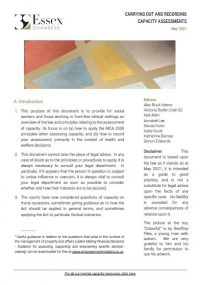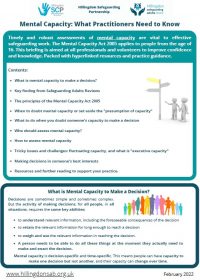Mental Capacity
The Mental Capacity Act 2005 provides a statutory framework to empower and protect people who may lack capacity to make decisions for themselves. It also establishes a framework for making decisions on their behalf. This applies whether decisions are for life changing events or for everyday matters. Timely and robust assessments of mental capacity are vital to effective safeguarding work. The Mental Capacity Act 2005 applies to people from the age of 16.
The Mental Capacity Act 2005 sets out five key principles:
- A person must be assumed to have capacity unless it is proved otherwise
- A person should not be treated as incapable of making a decision unless all practicable steps to help them reach a specific decision have been taken without success
- A person is not to be treated as incapable of making a decision merely because they make unwise decision/s
- Any decision made or action taken for a person who lacks mental capacity to do so for themselves, must be made or taken in their best interests
- A decision made on behalf of someone who lacks the mental capacity to do so for themselves, must always be made in the least restrictive way possible.
A person is deemed to lack mental capacity to make a specific decision at a specific time if they are unable, because of an impairment of, or a disturbance in the functioning of the mind or brain, to:
- understand the information salient to the decision to be made and/or
- retain the information of the decision to be made and/or
- use or weigh up the information necessary to the decision making process
- or to communicate their decision by any means.
When to Doubt Capacity
Safeguarding Adults Reviews often identify problems with practitioners’ legal literacy around mental capacity. A frequent issue arising in such reviews is that practitioners do not always understand when to doubt capacity and explore things further. Practitioners also struggle with navigating fluctuating capacity and executive capacity.
The Mental Capacity Act Code of Practice Paragraph 4.35 explains when the presumption should be set aside:
- If the person’s behaviour or circumstances cause doubt as to whether they have the capacity to make a decision
- If somebody else says they are concerned about the person’s capacity, or
- If the person has previously been diagnosed with an impairment or disturbance that affects the way their mind or brain works, and it has already been shown they lack capacity to make other decisions in their life.
If you are involved in mental capacity assessments or best interests decisions it is important to be familiar with the Mental Capacity Act Code of Practice. If there is still doubt about their capacity, a capacity assessment must then be completed. The Safeguarding Partnership has produced a briefing to help practitioners apply the Mental Capacity Act.
Downloads:



